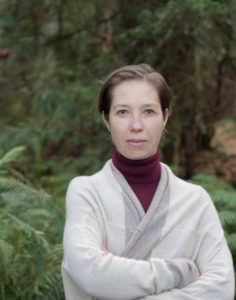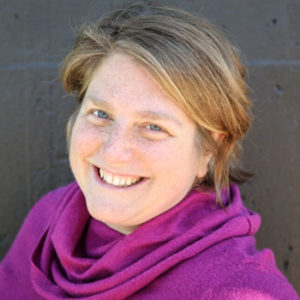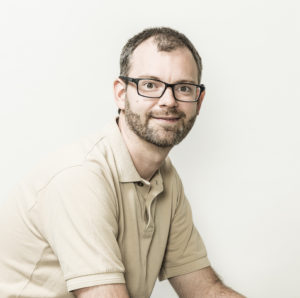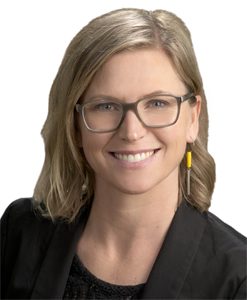Four York University researchers have received research awards from the Government of Canada’s New Frontiers in Research Fund (NFRF)-Exploration stream.
Professors Cristina Delgado Vintimilla (Faculty of Education), Sarah Flicker (Faculty of Environmental and Urban Change), Matthew Perras (Lassonde School of Engineering) and Dayna Scott (Osgoode Hall Law School) are the principal investigators on the winning projects, which were announced in late May.
“York University is delighted to see Professors Cristina Delgado Vintimilla, Sarah Flicker, Matthew Perras and Dayna Scott receive these highly competitive NFRF Exploration grants. My heartiest congratulations to them,” said Vice-President Research and Innovation Amir Asif. “These grants allow Canada’s foremost researchers to build strength in high-risk, high-reward and interdisciplinary research for societal benefit – an historical strength for the University.”

Cristina Delgado Vintimilla is an assistant professor in the Faculty of Education. Delgado Vintimilla’s project, titled “Ecological Devastation in Extractive Zones: Resistance, Recuperation and Regeneration,” received $248,053.00. Working with a multidisciplinary team of Indigenous and non-Indigenous researchers, artists and activists from across Canada and Ecuador, including Faculty of Liberal Arts & Professional Studies sociology Professor Denielle Elliott, the research team will explore what it takes to recuperate the devastation of the “Capitalocene.”
The project considers the urgent nature of ecological and environmental challenges posed by the devastation of blasted landscapes (Mountaintop removal mining, open-pit mining, strip mining). Women and children who are targets of annihilation through capitalism and colonialism, specifically, Black, Indigenous and people of colour (BIPOC), understand the value of non-hegemonic knowledges/practices to heal ruined places. The challenge is in recognizing their unconventional ways of knowing and doing as legitimate healing alternatives to the technological “fixes” that damaged blasted landscapes.
This research will congregate a diverse team of scholars, students, Indigenous activists, Elders, knowledge keepers and healers to lead an interdisciplinary project that draws from and contributes to education, anthropology, biology and the arts. The researchers’ approach is to codesign recuperative practices in “blasted landscapes” in Canada and Ecuador in an urgent effort to address the damage of extractive capitalism and exploitative investments. The sites— built on the dispossession and enslavement of BIPOC—are connected through capitalist, extractive industries that have left the environments forever changed.
The ecological devastation of these sites is the point of departure for this project. The researchers will ask: How are women and children who identify as BIPOC staging unconventional relations with the land to regenerate “blasted landscapes”? And how are they activating alternative modes of belonging in the process? How can we approach blasted landscapes as sites for imagining other futures?

Sarah Flicker, a professor in the Faculty of Environmental and Urban Change, is the principal investigator on the project “Transnational Perspectives on COVID-19’s Impact on Youth Sexuality, Risk and Relationships.” The project, which involves an international research team that includes Faculty of Education Assistant Professor Jen Gilbert, received $249,038.00 in funding.
COVID-19 has fundamentally altered nearly every aspect of youths’ relational lives; new norms regarding physical and social intimacy and access to public and private spaces affect family, peer, and sexual connections. The challenge of navigating this new terrain coincides with adolescence, a developmental period when choices regarding risk and well-being are already fraught and complicated. Though decisions around how to connect, date, and love continue to be influenced by factors including gender, race, sexual cultures, community, and space, pandemic logics cause a profound shift: behaviors that once sparked alarm are now endorsed as low risk (e.g., sexting); practices that were up for debate are now decidedly off limits (e.g., sleepovers); and what were idealized as innocuous romantic gestures are now the height of danger (e.g., kissing). Changing policies and regulations (e.g., wearing masks, keeping distance, forming pods) influence sexual and intimate possibilities in new and unanticipated ways.
The international and interdisciplinary team brings together scholars in education, psychology, public health, social work, sociology, and youth studies with expertise in participatory methods, sexuality, and global health research. The project’s multi-method, multidisciplinary, and multi-site research will examine how COVID-19 is redefining risk and re-forming youth sexuality in Australia, Canada, and the United States, all countries with liberal democracies with comparable discourses and debates surrounding youth sexuality, but starkly different experiences of and responses to the pandemic.
Results will be used to develop site-specific and transnational briefings, videos, podcasts, and other resources to help sex educators, parents and youth navigate social norms, health risks, and sexual relationships during (and, eventually, in the wake of) a pandemic.

Matthew Perras, assistant professor, Department of Civil Engineering at the Lassonde School of Engineering is the principal investigator on the project “Using machine learning to understand ancient climatic influences on the stability of cliffs and tombs in the Theban Necropolis of Egypt.” Working with an international research team that includes his colleague Usman Khan, also an assistant professor in the Department of Civil Engineering at Lassonde, who is a co-principal investigator on the project, the research focuses on the Theban Necropolis, a UNESCO World Heritage site comprised of tombs and temples near Luxor, Egypt. The project received $250,000 in funding.
The tombs in the Theban Necropolis are often shallow excavations with entrances at the base of cliffs. The tombs hold evidence of rock mass collapses during construction through to recent deterioration leading to potential instabilities. Climatic variations are known to cause rock to deteriorate, however, there is debate about the exact influence on crack growth rates. Due to lack of detailed observations and experiments on long-term crack growth in rock, since such experiments span many months or even years, current numerical tools are not capable of capturing the influences of climate change on crack growth. This leads to challenges in determining when instabilities will develop and problems designing preservation strategies. To address these challenges, Perras and the research team propose to utilize machine learning (ML) to aid in analyzing existing climate data and crack growth indicators to predict instability. A ML algorithm will be trained on current measurements (weather & crack movement), then on historic climate & photographs of crack growth.
Ancient climate records and models (Nile sedimentation, tomb flooding & collapses) could be used to back analyze the influence on crack growth with time. With the expertise of geotechnical engineering, geology, archaeology, data and climate science, the researchers will seek to understand the prevailing conditions that led to the current state of stability and develop guidelines for preserving the stability into the future. The novelty of this research is in the combination of machine learning with archaeology and geological engineering. Machine learning in both fields is in its infancy, however, such techniques allow for nuanced behaviors to be extracted from large and complex data sets as in this project. Understanding the current measurements, past influences and applying it to predict future instabilities will help to identify key areas for protection and aid in preserving this UNESCO site for generations to come.

Dayna Scott, York Research Chair in Environmental Law & Justice in the Green Economy; associate professor, Osgoode Hall Law School and the Faculty of Environmental and Urban Change, is the principal investigator of the project titled, “Jurisdiction Back: Infrastructure beyond Extractivism.” The project received $ 246,725.00 in funding.
Resource conflicts and legal uncertainties have dominated the political landscape over the last decade. From Standing Rock to the TransMountain pipeline, conflicts over extraction and its infrastructures have intensified, catalyzing a fierce Indigenous resurgence. As Scott and the research team conceived this project, Wet'suwet'en hereditary leaders were blocking a pipeline company from accessing their lands, inspiring solidarity actions that blocked rail lines, ports, highways, and political offices. The situation dramatically demonstrated that when corporate interests thrust contested projects onto Indigenous homelands - even with governmental approvals – they must contend with Indigenous governing authority.
The research project offers a transformative way forward: a fundamentally new set of relations based on different underlying assumptions about law and land. It is a vision that insists the future is not foreclosed, but pregnant with potential for renewed relations of jurisdiction and infrastructure. If anything, the new COVID-19 reality has only made this more obvious. Will we rebuild? Should we rebuild? Or, even more importantly, what should we build anew? The ground-breaking 2019 Yellowhead Red Paper documents how Indigenous-led consent processes based on fulfilling responsibilities are already having the effect of restoring Indigenous jurisdiction and reclaiming Indigenous lands and waterways, foodways and lifeways. Scott proposes to systematically document, support, expand and evaluate this work to determine which strategies and approaches have the most success. How can remaking the material systems that sustain collective life enact Indigenous jurisdiction? What does infrastructure resilience look like for Indigenous communities emerging out of COVID-19 in an era of ongoing climate crisis? How can the “just transition” to sustainable economies be imagined and infrastructured to foreground Indigenous governance systems? This project offers an agenda for fundamentally re-making our socio-technical systems; for both conceptualizing and building infrastructure otherwise.
Courtesy of YFile.
To learn more about Research & Innovation at York: follow us at @YUResearch; watch the animated video which profiles current research strengths and areas of opportunity, such as artificial intelligence and Indigenous futurities; and see the snapshot infographic, a glimpse of the year’s successes.
